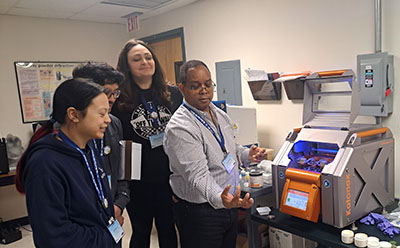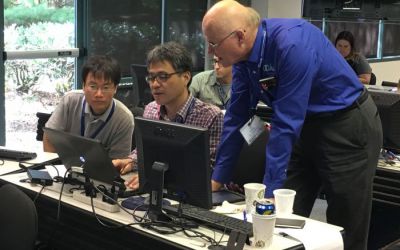ICDD X-ray Powder Diffraction Courses
Let Our Team of Experts Help You Take Your XRD Skills to the Next Level
X-ray Powder Diffraction Courses
XRD Session I: 1 – 5 June 2026
XRD Session II: 8 – 12 June 2026
During the past seven decades, the use of X-ray analytical methods has seen continued growth in the areas of materials characterization and phase identification. Over the years, the development of procedures, techniques, and advanced equipment have greatly enhanced the versatility of the method.
The purpose of the XRD course is to provide participants with a fundamental understanding of the theoretical basis as well as the practical application and implementation of powder diffractometry in today’s laboratory. This knowledge and understanding is applicable whether the attendee works in academia, industry, or government laboratory, or whether they are a student, professor, researcher, or analyst.
The XRD course is presented in two separate week-long sessions, each of which stands alone as a complete class.
Session I
Fundamentals of X-ray Powder Diffraction is directed to both relative newcomers in the field and to more experienced users wishing to broaden their understanding of fundamental concepts and established procedures. The major emphases of Fundamentals of X-ray Powder Diffraction are the acquisition of reliable experimental data and qualitative phase identification using both manual and automated search techniques.
Session II
Advanced Methods in X-ray Powder Diffraction is designed for the experienced user and focuses on computer-based methods of qualitative and quantitative phase analysis, as well as crystal structure analysis and refinement. For maximum benefit from the Advanced Methods in X-ray Powder Diffraction, the ICDD course faculty strongly recommends that students have previously attended Session I.
The format of the course is a combination of morning lectures and afternoon recitations and workshops. Ample opportunity for individual student-faculty interaction exists throughout each week, including small recitation and workshop groups and a session where students can discuss their applications and problems with the entire faculty.
Session I Course Outline
- Production and properties of X-rays: continuous and characteristic radiation, absorption, scatter and diffraction
- Production of monochromatic X-radiation: choice of source conditions, use of beta-filters, proportional detectors and pulse height selection, monochromators, use of the Si(Li) and Ge(Li) detectors
- Components of the diffraction pattern: expected reflections, Miller indices, unexpected reflections, effect of scatter and fluorescence, factors affecting peak positions and intensities
- The powder diffractometer: optical arrangement, factors affecting instrumental profile widths; choice and function of divergence slits, calibration and alignment, detectors, X-ray optics
- Acquisition of good diffraction data: specimen requirements, preparation techniques, use of standards, and proper operation of powder diffractometers
- Qualitative phase identification: the Powder Diffraction File™, quality of reference patterns, the Alphabetical, Hanawalt, and Fink Indexes, automated methods, and specialized subfiles
- Industrial applications of X-ray powder diffraction
- Hands-on use of computers for demonstration of the latest software
- Data mining with the PDF
Session II Course Outline
- Brief review of fundamentals
- Factors affecting accuracy of measured 2theta values: intensity aberrations, specimen displacement, specimen transparency, diffractometer alignment, and the use of external and internal standards
- Factors affecting intensities of diffraction peaks: structure-sensitive properties, specimen-sensitive effects, and measurement-sensitive effects
- Use of computer methods for data reduction and qualitative phase identification: peak-hunting methods, alpha2 stripping, search/match techniques and the Powder Diffraction File™, use of elemental data, error windows and probability searching, and scoring algorithms
- Advanced data mining with the PDF®
- Exploration of powder pattern indexing methods
- Quantitative analysis: specimen preparation considerations, Reference Intensity Ratios, absorption correction methods, matrix-flushing methods, and whole-pattern analysis using the Rietveld method
- Structure solution and refinement using the Rietveld method
Not sure which XRD session you should attend? Click here to print our short quiz to help!
When & Where
1 – 12 June 2026
XRD Session I – Fundamentals of X-ray Powder Diffraction: 1 – 5 June 2026
XRD Session II – Advanced Methods in X-ray Powder Diffraction: 8 – 12 June 2026
Register by 20 April and save $250!
ICDD Headquarters
12 Campus Boulevard
Newtown Square, PA 19073-3273 USA
Phone: (610) 325-9814
If you have any questions, please contact education@icdd.com
What's Included
The registration fee for these courses includes:
- Lecture, workshop, and lab materials
- Catered lunch Monday through Thursday
- Coffee and snack breaks
Schedule
Classes are held:
Session I
- Monday: 8:30 am to 6:00 pm
- Tuesday: 8:30 am to 4:30 pm
- Wednesday: 8:30 am to 4:30 pm
- Thursday: 8:30 am to 6:00 pm
- Friday: 8:30 am to 12:00 pm
Session II
- Monday: 8:30 am to 6:00 pm
- Tuesday: 8:30 am to 4:30 pm
- Wednesday: 8:30 am to 5:00 pm
- Thursday: 8:30 am to 6:00 pm
- Friday: 8:30 am to 12:00 pm
On-site XRD Training
The ICDD can customize our leading-edge educational courses to meet the X-ray powder diffraction training needs of your employees. With on-site training, you will have the advantage of our faculty member’s dedicated attention, addressing the specific needs of your staff, all while working hands-on with your instrument. A minimum of six employees is required for this service.
To discuss further customized training at your location, please contact Elizabeth Dempsey, ICDD’s Education Coordinator.
Faculty
The course faculty is selected from academic, industrial, and government institutions under the direction of ICDD.
- Dr. Tom Blanton
- Justin Blanton
- Dr. Cyrus Crowder
- Dr. Anja Vieira Dosen
- Dr. Tim Fawcett
- Dr. Soorya Kabekkodu
- Dr. James Kaduk
- Dr. Susan Quick
- Dr. Mark Rodriguez
- Charles Weth
- Nichole Wonderling
To help ease the impact of budget constraints, ICDD has lowered the cost of our XRD Courses.
Session I: Fundamentals of X-ray Powder Diffraction
1 – 5 June 2026
Price of course after 20 April 2026: $1,250
Registration deadline: 18 May 2026
Session II: Advanced Methods in X-ray Powder Diffraction
8 – 12 June 2026
Price of course after 20 April 2026: $1,250
Registration deadline: 18 May 2026
Sessions I & II: Fundamentals and Advanced Methods
1 – 12 June 2026
Price of course after 20 April 2026: $2,250
Registration deadline: 18 May 2026
If you cannot register online, please complete the XRD Registration Form.
Do you have a group of 3 or more attendees? Get an additional 10% off! Contact education@icdd.com for pricing. To obtain the group discount, all registrations must be submitted simultaneously. Registrations made before or after are not eligible for the discount.
Registration fees for training courses include lectures, workshops, lab materials, and catered lunches on all full days. Payment must be received before the start of the course to attend. Online registrations will be accepted up until two weeks before the start of the course; after that time, please call for availability.
ICDD reserves the right to use all photographs taken throughout the classes to promote the course without additional approval from you, the participant.
Tuition Waiver Opportunities
ICDD offers a limited number of tuition waivers for the XRD courses. Faculty members and graduate students are encouraged to apply. If you are currently developing a program in X-ray powder diffraction (XRD), and are interested in incorporating these topics into an established course, a tuition waiver can provide you with the opportunity to learn the principles and practices from some of the experts in the field.
Get more information and apply here.
Host Hotel
The Hilton Garden Inn Newtown Square is the host hotel for the ICDD courses. Accommodations booked within our room block will include round-trip transportation to ICDD. Please ensure you use the reservation link specific to your course. Visit our Host Hotel webpage for more information.
Transfer, Cancellation, and Refund Policy
ICDD must guarantee payment for meals and materials in advance. You will receive a 50% refund of the paid registration fee if your written cancellation is received at ICDD 20 business days prior to the start of the class. With less notice, a colleague may take your place, or the course materials will be mailed to you, but no refund will be given.
Please note: A minimum of 10 registrants per course is required, otherwise the course will be cancelled and your registration fee will be refunded. You will be notified of a course cancellation no later than two weeks prior to the start of the course.
If you have any questions, please contact education@icdd.com



